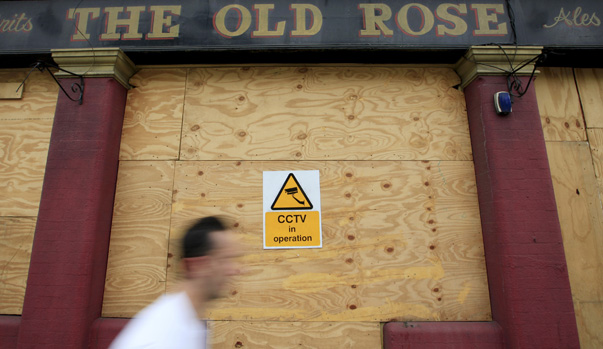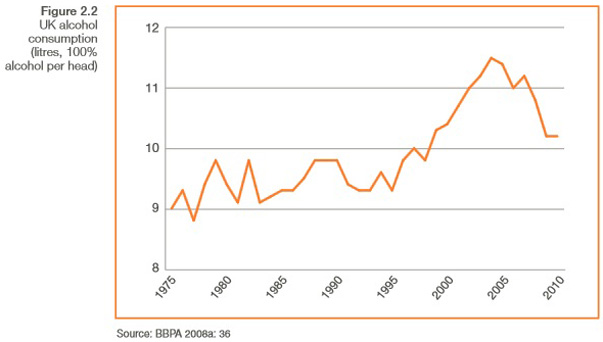The claim
 “In my constituency, lots of pubs have closed, but it is usually because of demographic change.”
“In my constituency, lots of pubs have closed, but it is usually because of demographic change.”
Stephen Williams, 26 January 2015
The background
A government minister has become the latest parliamentarian to cause controversy by suggesting that the decline of the British pub is connected to immigration.
Stephen Williams, who is the Lib Dem MP for Bristol West and Minister for Communities, told the House of Commons: “In my constituency, lots of pubs have closed, but it is usually because of demographic change.
“Some parts of my constituency, which had a white working-class community 20 or 30 years ago, are now populated primarily by recently arrived Somalis and other people. Obviously the pubs in those areas have closed, and some have been converted to other uses, but some of them are still derelict.”
His words come after the Conservative peer Lord Hodgson told the Lords last month: “In areas of Nottingham, Leicester, Manchester, Leeds and Birmingham the increase in the Muslim population who don’t drink leads to many pub closures.”
Is there a connection between an increasing Muslim population and pub closures?
The analysis
It’s important to note the context of Mr Williams’s remarks.
A cross-party group of MPs, backed by pro-pub lobbyists the Campaign for Real Ale (Camra), are calling for a change in planning law to protect pubs.
Campaigners want to see a planning application required before a pub is demolished or converted into a shop or whatever, giving local people the chance to object.
The government says people can already protect pubs from closing by signing a petition to have it listed as an “asset of community value”. Ministers are resisting the idea of extending a new blanket protection to all pubs, because some are no longer viable.
“It was a debate on planning policy and I pointed out commerce changes in response to population change,” Mr Williams said.
According to the 2011 census, Bristol has the UK’s third biggest Somali population after London and Birmingham, with just under 5,000 people on record – although the local council thinks the real number is more like 10,000.
Bristol city council notes that Muslims were the religious group that grew the fastest between the 2001 and 2011 census, with the percentage of the local population identifying as Muslim rising from 2 to 5 per cent.
Nationwide, about 3 per cent of people in England and Wales identified themselves as Muslims in the 2001 census, and by 2011 it was 4.8 per cent.
We’re not in a position to confirm or disprove Mr Williams’s local knowledge on pub closures in areas with high immigration.
Neither can we definitively prove Lord Hodgson right or wrong.
The problem is that, while various statistics show that pubs are closing across the country, we don’t have data that goes down to the level of individual neighbourhoods.
We can’t say whether there is a correlation between pub numbers and the local Muslim population in a small geographical area.
Dwindling numbers
There’s little dispute that Britain has been losing pubs in recent years, though different bodies publish different estimates.
The British Beer & Pub Association (BBPA) says there were about 48,000 pubs in the UK in 2013, down from 59,000 in 2004.
Camra says there are just over 54,000 pubs still serving across Britain, but warns that pubs are currently closing at the rate of 29 a week.
No one is able to break the figures down at the level we need to compare with changing demographics at the neighbourhood level.
Camra sometimes publishes figures by region, which shows that pubs are disappearing across the country at a similar rate.
The Institute for Public Policy Research (IPPR) has regional figures for closures between 2005 and 2009, which also shows that there was a downward trend across the country:
Various think tanks have looked at the issue and come up with a number of possible reasons for the trend, including: the 2007 smoking ban, the economic downturn, the availability of cheap supermarket alcohol, planning laws, changing social norms, the greed of the big pub companies.
There is fierce disagreement about the biggest factors, but no-one who has taken a serious public policy interest in the shrinking pub market has put forward the rising Muslim population as one of them.
Chris Snowdon of the pro-free market Institute of Economic Affairs, who recently published a paper on pubs, told us: “I don’t think that changing demographics have affected pub numbers for the simple reason that immigration, for the most part, has supplemented, not replaced, the native (drinking) population.
“There may be some areas with very high Muslim populations where it has been a factor, but across the country as a whole there are more drinkers than there were in 1980.”
IPRR research bears this out:
The think tank notes: “There is a causal link between alcohol consumption and economic growth, showing falls in UK alcohol consumption that correspond with the economic recessions of the early 1980s and 1990s.
“It then shows a steady growth in consumption as the economy grew substantially during the last decade and a half.”
In other words, a rising Muslim population would only affect the national pub industry if it meant there were a lot more non-drinkers around, but it seems that there are more drinkers in Britain than there were 30 years ago. And economics, not demographics, appear to explain the ups and downs best.
While drinking is up in the long-term, beer consumption has fallen and more of us are buying beer in off-licences rather than pubs, according to the IPPR.
The verdict
We can’t discount the possibility that pubs in some neighbourhoods have closed thanks to the changing demographics of the local population.
But we also can’t find any data that supports the theory that an increase in the Muslim population of some UK cities has led to falling numbers of pubs. It remains purely anecdotal.
The fact that alcohol consumption has risen in the long-term in Britain suggests that the “Muslim hypothesis” cannot explain nationwide changes in drinking habits.
It’s not a notion that policy experts have generally taken seriously. There are plenty of other more plausible, evidence-based theories about why the UK pub trade is in trouble, though arguments continue to rage about the biggest single factor.







